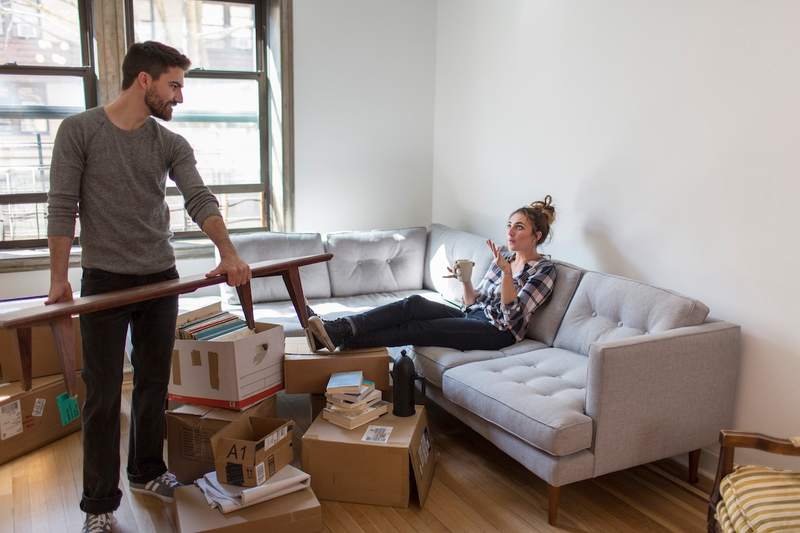You may have felt buyer’s remorse after splurging on a purchase that you later find you dislike, didn’t really need or can’t afford. When buying a home, though, you can’t just return it and get your money back. Learn more about the common causes of buyer’s remorse and ways to avoid it.
Key Takeaways:
- Home buyers can feel remorse if they overpaid for a home, bit off more than they can chew, or rushed the decision.
- You can avoid buyer’s regret by taking your time, working with a real estate agent and fully understanding the upfront and ongoing costs of homeownership.
- If you experience buyer’s remorse, you can give it time, make small changes, or sell the home.
What Is Buyer’s Remorse?
Buyer’s remorse is the feeling of regret or disappointment after a home purchase. It could be as simple as dissatisfaction with the current market or as heavy as the feeling that you made a poor decision and bought the wrong home. According to a 2024 survey from Clever Real Estate, 82% of home buyers say they have at least one regret about the home buying process. For some new homeowners, there’s more than one reason to feel let down by their home purchase.
“Experiencing buyer’s remorse is more common than you might think, especially with the complexities of today’s housing market,” says John Gluch, owner of Gluch Group, a real estate agency in Phoenix. “I’ve seen it firsthand. Often, this regret stems from a disconnect between what you expected and the reality of owning a home.”
What’s Your Goal?
Buy A Home
Discover mortgage options that fit your unique financial needs.

Refinance
Refinance your mortgage to have more money for what matters.
Tap Into Equity
Use your home’s equity and unlock cash to achieve your goals.
6 Common Sources Of Buyer’s Remorse
Here are a half-dozen reasons home buyers regret their purchase.
1. You Paid Too Much
The Clever survey found that 23% of home buyers felt they spent too much and bought more house than they could afford. Another 23% of homeowners felt their interest rate was too high. It’s easy to see why: Homes cost more than they used to. In September 2019, the median sales price for a new home in the U.S. was $315,700. Only five years later, it’s $426,300. But some home buyers still feel they could’ve gotten a better deal. If you faced competition from other buyers, you may feel your offer was too high.
2. You Rushed Your Decision
If you had to move to start a job or faced a similar deadline for buying a home, you may not have had that much time to house hunt. Maybe you were so excited to be able to afford to buy a home that you jumped at the first one you liked without exploring your options.
“If you rushed your purchase because of market pressures, you might end up in a home that doesn’t fit your needs,” Gluch says.
The Clever survey found that 22% of home buyers said they bought their home too quickly.
3. You Don’t Like The Home
Sometimes, you and your home just don’t match. Maybe the house passed the home inspection, but major systems broke down and needed repairs after you moved in. Perhaps you didn’t realize until you moved in that the house is drafty and cold at night. Maybe it’s an older home, so it’s loud and creaky. If you moved in and suddenly found pests, that’s certainly a reason to feel some regret about your purchase.
4. You’re Unhappy With The Location
If you wanted to live in a lively central area but were priced out of the market, it’s understandable why a home in a sleepy suburb feels like a letdown. Maybe you’re now farther away from friends and family. If you had to move to be closer to work, the location of your new home may not have been what you wanted for yourself. You never truly know what it’s like to live somewhere until you’ve lived there, and your new neighborhood may not have met your needs.
5. The Maintenance Is Overwhelming
According to the Clever survey, recent homeowners’ most common regret is that the maintenance costs are too high. Of those surveyed, 28% said their home requires too much maintenance. Furthermore, 35% said the seller wasn’t upfront with them about maintenance costs.
6. You Miss Your Old Home
You may have had a lot of history with your previous home and find yourself missing it. If you have a lot of great memories of living there, the nostalgia can be difficult to kick. Sometimes, a new house doesn’t at first feel like it’s really yours, contributing to feelings of regret.
Ready To Become A Homeowner?
Get matched with a lender that can help you find the right mortgage.
Options For Home Buyers With Remorse
If you’ve recently bought a home and are unhappy with it, here are some ways to cope.
Give It Time
You can start by taking a breath. It’s normal to feel overwhelmed, and it may take time for you to settle into a new home. If you want to make changes, sometimes simple fixes, such as a fresh coat of paint, can tide you over until you can afford to make more significant changes.
“If you find yourself regretting your purchase, try to focus on what drew you to your home in the first place,” Gluch says. “Think about its positive aspects and the long-term value you might gain. Sometimes, just planning some minor upgrades can really change how you feel about your home and help you see its potential.”
Sell Your House
If you’ve been in the home for a while and are still unsatisfied, you could sell it and start over. However, you should know that if you sell your home less than a year after you bought it, you’ll have to pay capital gains taxes at the highest rate. There also might be a prepayment penalty on your mortgage.
Take The First Step To Buying A Home
Find a lender that will work with your unique financial situation.
6 Steps To Avoid Buyer’s Remorse
If you’re looking to buy a home, here are some steps to avoid feeling buyer’s remorse.
1. Make A List Of Wants, Needs And Must-Haves
Figuring out your priorities before shopping for a home can help you be more confident you’ll buy a home you like. You may have to make certain compromises, but you’ll get the reassurance of knowing that the home meets your most essential needs.
“Never settle for a home that doesn’t tick all your really important boxes, no matter the pressure to make a quick decision,” Gluch says. “Making a well-informed choice from the start will really improve your long-term satisfaction with your home.”
2. Work With An Agent
Working with an experienced real estate agent to guide you through the home buying process can help you avoid regretting your home purchase.
“To prevent buyer’s remorse, as your real estate agent, I make sure to lead you through a thorough needs assessment before you even start looking at properties,” Gluch says.
An agent can also help you find the right home and negotiate the best possible deal.
3. Understand The Ongoing Costs
Sometimes, home buyers focus too much on the upfront costs of buying a home and underestimate the ongoing expenses. If you’re used to renting, you might not know how much to set aside for maintenance and repairs. If your new home is larger than your previous residence, you may be surprised how much the utilities cost.
“It’s easy to forget the extra costs like property taxes, upkeep, and those surprise repairs that suddenly come up after you’ve moved in,” Gluch says.
4. Include Contingencies In Your Contract
Contingencies are conditions that must be met for the sale to go through. Including contingencies in your purchase and sale agreement allows you to cancel the sale if things go wrong. For example, a home inspection contingency lets you walk away without penalty if the inspection reveals the home is unsafe or needs significant repairs. An appraisal contingency enables you to cancel the deal if the appraisal comes in lower than expected. Since lenders won’t let you borrow more than a home is worth, a low appraisal means you’d have to make up the difference yourself or cancel the deal.
5. Make Sure The Location Works For You
If you buy a home in an area you won’t be happy living in, you’re setting yourself up for disappointment. Even if it’s the best house in town, you won’t be satisfied if it’s located in an area you dislike. If it’s important to live near your family and friends, don’t buy a home on the other side of town. Avoid buying a home too far from your job if you don’t want a long commute.
6. Stop Looking At Other Properties
You may have grown accustomed to browsing home listings when you were house hunting. You may still have current listings showing up in your email inbox on a daily or weekly basis. If so, do yourself a favor and unsubscribe from those emails and stop browsing new home listings. You’ll only torture yourself by comparing your new home with what else is out there.
FAQ
Here are answers to some frequently asked questions about home buyer’s remorse.
The Bottom Line
Feeling a bit of buyer’s remorse is normal. Most homes have flaws, and your budget may have prevented you from buying your ideal dream home. Focusing on your biggest goals and priorities can help you find a home that’s the right fit – even if it’s not your forever home. You can avoid real regret by taking your time to find the right home and make sure you can afford both to buy and own it.

Rory Arnold
Rory Arnold is a Los Angeles-based writer who has contributed to a variety of publications, including Quicken Loans, LowerMyBills, Ranker, Earth.com and JerseyDigs. He has also been quoted in The Atlantic. Rory received his Bachelor of Science in Media, Culture and Communication from New York University. He also completed the SoFi/Coursera Fundamentals of Personal Finance Specialization consisting of five courses: Introduction to Personal Finance, Saving Money for the Future, Managing Debt, Fundamentals of Investing, and Risk Management in Personal Finance.












